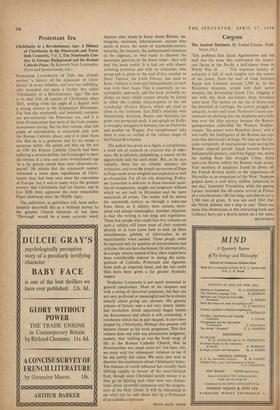Cargoes
The Ancient Mariners. By Lionel Casson. (Gol- lancz, 21s.)
'THE problem that faced Agamemnon and his staff was the same that confronted the Ameri- can forces in the Pacific a half-dozen times in World War 11. . . .' This maritime history of antiquity is full of such insights into the nature of sea power, from the start of trade between Egypt and Lebanon around 2,500 BC, to the Byzantine dromons, armed with their secret weapon, the devastating Greek Fire, slugging it out with the Arab sea-hordes three thousand years later. The section on the rise of Rome and the downfall of Carthage, the central struggle of antiquity, is very well done. Professor Casson con- centrates on showing that the elephants were only sent over the Alps anyway because the Roman quinqueremes controlled the Western Mediter- ranean. 'Sea power wore Hannibal down,' and it was really the intelligence of the Roman sea cap- tains that destroyed Carthage. We also see the fan- tastic complexity of international trade during the Roman imperial period. Egypt became Rome's indispensable granary, and from Egypt, too, sailed the trading fleets that brought China, India and even Burma within the Roman trade nexus. Vast numbers of amphorae found by divers off the French Riviera testify to the importance of Marseilles as an emporium of the West. 'Neptune gulped down a cool thirty million [sesterces] in one day,' lamented Trimalchio, while the gaping Lucian recorded the off-course arrival at Piraeus of a merchantman 180 feet long, and able to carry 1,300 tons of grain. 'It was not until 1845 that the North Atlantic saw a ship its size.' There are many fine illustrations in this interesting book and Gollancz have put a decent jacket on it for once.
DAVID REES


































 Previous page
Previous page